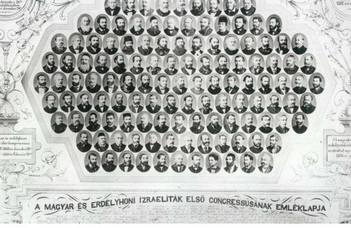“Unhealed Breach” Or A Good Divorce?

2019. február 05. - 2019. február 06.
1088 Budapest, Múzeum krt. 4/A. Meeting Hall (039.) & MTA HTK, 1097, Budapest, Tóth Kálmán u. 4. K 011.
2019. február 05. - 2019. február 06.
1088 Budapest, Múzeum krt. 4/A. Meeting Hall (039.) & MTA HTK, 1097, Budapest, Tóth Kálmán u. 4. K 011.
Tuesday, 5 February
Location: Meeting Hall, 1088 Budapest, Múzeum krt. 4/A. 039.
13.00 Greetings and Introductions
From the Austro-Hungarian Compromise to the Jewish Congress: The Formative Years of Liberal Hungary
Tibor Frank, prof. emeritus, Eötvös Loránd University
András Heisler, President, Federation of Hungarian Jewish Communities
First panel (13.30–15.00) – Context
Chair: Mary Gluck (Brown University)
The Pursuit of the Sanhedrin: The Hungarian Jewish Congress in the Tradition of Nineteenth-Century Synods – Carsten Wilke (Central European University)
Confessional Autonomy in Hungary: József Eötvös's Point of View – Gábor Gángó (Max Weber Center for Advanced Cultural and Social Studies, University of Erfurt)
Truth and/or Peace: The Political Toolbox of the Jewish Congress – Tamás Turán (Institute for Minority Studies, HAS; Eötvös Loránd University, Budapest)
Keynote (18:00-18:45)
Chair: Géza Komoróczy (prof. emeritus, Eötvös Loránd University, Budapest)
The Inevitable Breach? The Congress of 1868–69 and the Fissures within Hungarian Jewry – Michael K. Silber (The Hebrew University, Jerusalem)
Wednesday, 6 February
Location: Research Centre for the Humanities, Hungarian Academy of Science
1097 Budapest, Tóth Kálmán u. 4. (MTA HTK), hall K 011.
9.00 Greetings
Attila Papp Z., Director, Institute for Minority Studies, HAS
Second panel (9.00-10.30) – Struggles
Chair: Tamás Biró (Eötvös Loránd University, Budapest)
Defending the Old from the New: The Preservative Aims of the Hungarian Jewish Congress – Howard Lupovitch (Wayne State University)
The Progresssive Political Role of Rabbi Mihály Morgenstern during the Congress of 1868–69 – Mihály Huszár (Museum of Marcali)
The Divide of the Jewish Community from Nagyvárad after the Hungarian Jewish Congress (1868–1869). The Creation of the Community Status-quo ante from Nagyvárad – Edith-Emese Bodo (University of Oradea)
Third panel (11.00-12.30) – Echoes
Chair: Michael L. Miller (Central European University)
Cisleithanian Lesson from the Schism – Daniel Baránek (Jewish Museum in Prague)
The Echoes of The Hungarian Jewish Congress (1868–69) Among the Jewish Communities in Croatia – Ljiljana Dobrovšak (Institute of Social Sciences Ivo Pilar, Zagreb)
From the Other Side of the World: American Jews look to Budapest – Elena Hoffenberg (University of Haifa)
Fourth panel (14.00-15.30) – After-effects
Chair: László Csorba (Eötvös Loránd University, Budapest)
Unfinished Emancipation: the "Schism" in Context of Religious Equality of the Jews – Anikó Prepuk (University of Debrecen)
Why did the Neolog Establishment Strive for the Reunification of Hungarian Jewry? – Miklós Konrád (Institute of History, HAS)
Reunification Efforts and Metalanguages in Hungarian Jewish Press – Norbert Glässer (University of Szeged) and András Zima (Jewish Theological Seminary – University of Jewish Studies, Budapest)
Fifth panel (16.00-17.00) – Orthodox Implications
Chair: Michael K. Silber (The Hebrew University, Jerusalem)
What Was it All About? Two Orthodox Retrospectives on the 1869 Schism – Yoav Sorek (Ben Gurion University of the Negev, Israel)
The Geography of Post-Schism Responsa in the Hungarian Hinterlands: The Case of Bychkiv – Elli Fischer (Tel Aviv University)

